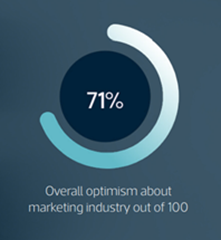Articles and insights
- Content hub
The latest reports, editorial and thought leadership from our experts.
More to explore
- Sustainable marketing
- Media Advisory Panel

Interview: Why is the turnover of CMOs greater than ever?
The Chartered Institute of Marketing’s “CMO 50” report reveals the vast majority of marketing leaders (71%) believe the COVID-19 pandemic has had a positive impact on the perception of their brands. Despite this level of optimism, marketing leaders are staying in their roles for an ever-shorter length of time, with turnover of CMOs becoming an increasing issue.
In this article, CIM spoke to Allyson Stewart-Allen, CEO of International Marketing Partners and CIM Fellow who shares her views on the role of the CMO and whether a shift in mindset could reverse the trend of marketing leaders moving to pastures new.


So why are CMOs looking to move on from their current organisations?
While many businesses expect more than ever from their CMOs, new appointees aren’t always delivering which could be down to poor onboarding or a disconnect in the skills hired versus required. Another is that CMOs want to deliver more value and credibility within their roles but feel they aren’t given the opportunity to do so. Both may be true, depending on how the CEO and Board view the role of the Marketing function in the modern business.
What is the current situation regarding CMOs staying on in their roles?
The turnover of Chief Marketing Officers (CMOs) has increased rapidly. They may not yet be at the same level as managers at football clubs (75 managers across the top four tiers of English football left their roles in 2020) but the trend is increasing according to research from search consultant Spencer Stuart, with CMOs now lasting only 40 months in the role – the lowest figure in at least a decade.
The data on mean CMO tenure is skewed by a small number of long-serving executives. Median tenure for CMOs has dropped to 25 months. In other words, newly appointed CMOs may have as little as two years to show they’ve made a tangible commercial impact.
 What should CMOs do to prove their authority at C-suite level?
What should CMOs do to prove their authority at C-suite level?
As a strategic leader within the business, the CMO should be seated equally at the Boardroom table.
In fact, a global study of 4,000 employees conducted by Arlington Research and the Chartered Institute of Marketing (CIM) found that nearly half of decision makers (49%) questioned whether their company had a strategic vision. A critical part of any strategy is to understand the problem a business is trying to solve, so it’s encouraging to see 76% of the 1,000 decision makers questioned stating that they regularly survey their customers. Over a third of employees (37%) said their organisation didn’t have an adequate process to share knowledge of customer needs upwards in the company and worryingly, 56% of decision makers agreed.
Better-aligned performance metrics will be important to enable staff to understand the thinking behind key decisions. CEOs should not be surprised if CMOs are held accountable only through metrics such as the results of a marketing campaign or the outcome of a website design, neither of which really contribute to business strategy outcomes. The strategic CMO, in contrast, will expect to be judged on relevant enterprise-wide goals such as revenue performance and top-line growth, and will formulate strategy ideas accordingly.
What role does the CMO play in an organisation?
Most executives agree that the modern CMO role should be principally a strategic position. Marketing is no longer the support function for Sales. The time has come for organisations to stop viewing Marketing as the function that spends the money and start seeing the value it delivers to the top and bottom lines. CMOs must work much more closely with senior leaders in the business to ensure the value proposition is right for today’s domestic and international marketplaces – and for tomorrow’s.
How can CMOs make a quick and longstanding impact in their organisation?
One opportunity to make an early impact could be found in looking beyond their organisation’s products and services sub-brands to the brand itself. Far too few CMOs work closely with senior colleagues, such as Chief Strategy Officers and Heads of Corporate Affairs to define what the business stands for and how it lives and breathes those values in practice.
And finally, do you think CMOs have the capability to progress in an organisation?
Yes, not only could nurturing such capabilities such as those above ensure CMOs are not so short-lived, they could also underpin further career progression within the organisation. After all, the ability to build and execute a strategy for growth is required at every level of seniority.
To read more of Allyson’s thoughts, click here
To read the CIM CMO50 report, click here

An overview of CIM our history and services.
We’ll always treat your personal details with the utmost care and will never share or sell them to third parties. You are always in control of how we contact you – you can change your contact preferences at any time. For more information, visit our privacy policy.
To receive sector specific news: